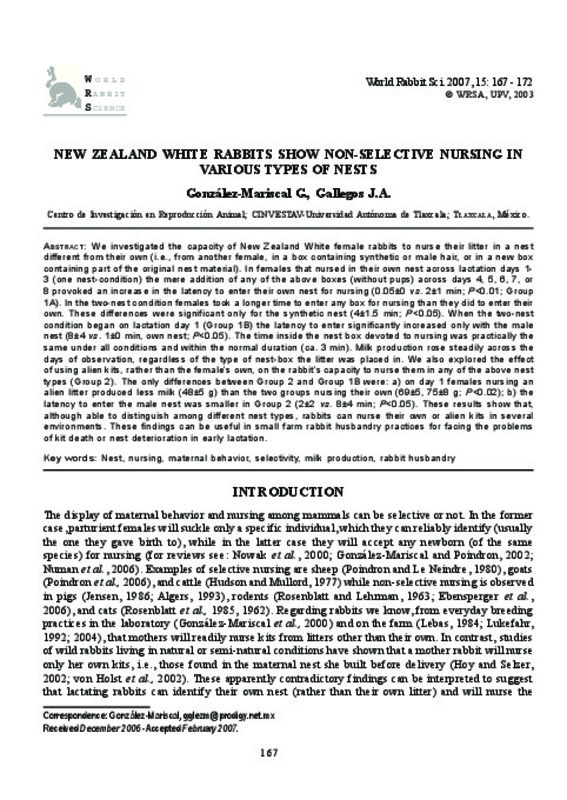JavaScript is disabled for your browser. Some features of this site may not work without it.
Buscar en RiuNet
Listar
Mi cuenta
Estadísticas
Ayuda RiuNet
Admin. UPV
New Zealand White rabbits show non-selective nursing in various types of nests
Mostrar el registro sencillo del ítem
Ficheros en el ítem
| dc.contributor.author | González-Mariscal, G
|
|
| dc.contributor.author | Gallegos, J.A.
|
|
| dc.date.accessioned | 2011-02-08T12:13:35Z | |
| dc.date.available | 2011-02-08T12:13:35Z | |
| dc.date.issued | 2007 | |
| dc.identifier.issn | 1257-5011 | |
| dc.identifier.uri | http://hdl.handle.net/10251/9489 | |
| dc.description.abstract | [EN] We investigated the capacity of New Zealand White female rabbits to nurse their litter in a nestdifferent from their own (i.e., from another female, in a box containing synthetic or male hair, or in a new boxcontaining part of the original nest material). In females that nursed in their own nest across lactation days 1-3 (one nest-condition) the mere addition of any of the above boxes (without pups) across days 4, 5, 6, 7, or8 provoked an increase in the latency to enter their own nest for nursing (0.05±0 vs. 2±1 min; P<0.01; Group1A). In the two-nest condition females took a longer time to enter any box for nursing than they did to enter theirown. These differences were significant only for the synthetic nest (4±1.5 min; P<0.05). When the two-nestcondition began on lactation day 1 (Group 1B) the latency to enter significantly increased only with the malenest (8±4 vs. 1±0 min, own nest; P<0.05). The time inside the nest box devoted to nursing was practically thesame under all conditions and within the normal duration (ca. 3 min). Milk production rose steadily across thedays of observation, regardless of the type of nest-box the litter was placed in. We also explored the effectof using alien kits, rather than the female's own, on the rabbit's capacity to nurse them in any of the above nesttypes (Group 2). The only differences between Group 2 and Group 1B were: a) on day 1 females nursing analien litter produced less milk (48±5 g) than the two groups nursing their own (69±5, 75±8 g; P<0.02); b) thelatency to enter the male nest was smaller in Group 2 (2±2 vs. 8±4 min; P<0.05). These results show that,although able to distinguish among different nest types, rabbits can nurse their own or alien kits in severalenvironments. These findings can be useful in small farm rabbit husbandry practices for facing the problemsof kit death or nest deterioration in early lactation. | es_ES |
| dc.language | Inglés | es_ES |
| dc.publisher | World Rabbit Science. ICTA. UPV | es_ES |
| dc.relation.ispartof | World Rabbit Science | |
| dc.rights | Reserva de todos los derechos | es_ES |
| dc.subject | Nest | es_ES |
| dc.subject | Nursing | es_ES |
| dc.subject | Maternal behavior | es_ES |
| dc.subject | Selectivity | es_ES |
| dc.subject | Milk production | es_ES |
| dc.subject | Rabbit husbandry | es_ES |
| dc.title | New Zealand White rabbits show non-selective nursing in various types of nests | es_ES |
| dc.type | Artículo | es_ES |
| dc.date.updated | 2011-02-08T11:13:28Z | |
| dc.identifier.doi | 10.4995/wrs.2007.592 | |
| dc.rights.accessRights | Abierto | es_ES |
| dc.description.bibliographicCitation | González-Mariscal, G.; Gallegos, J. (2007). New Zealand White rabbits show non-selective nursing in various types of nests. World Rabbit Science. 15(3). https://doi.org/10.4995/wrs.2007.592 | es_ES |
| dc.description.accrualMethod | SWORD | es_ES |
| dc.relation.publisherversion | https://doi.org/10.4995/wrs.2007.592 | |
| dc.description.volume | 15 | |
| dc.description.issue | 3 | |
| dc.identifier.eissn | 1989-8886 | es_ES |








